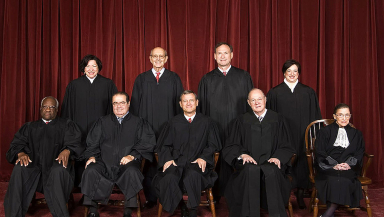
The Supreme Court ruled in favor of Christian liberal arts school Wheaton College Thursday in a debate over birth control access for their employees.
The court affirmed that the Obamacare mandate of free contraceptives does not apply to employers who demonstrate that the law violates their religious beliefs and is a burden, but added that these employers do not have to submit a form to have their insurers pay for the contraceptives.
Previously, religious employers who opposed the birth control mandate had to submit form EBSA-700 identifying their objections, and their insurer would pay for the coverage. The court's temporary injunction, however, relieves employers from this responsibility.
The unsigned judgment, which was a little over one page, maintained that women's access to birth control would not be restricted by the ruling.
"Nothing in this interim order affects the ability of the applicant's employees and students to obtain, without cost, the full range of FDA approved contraceptives," the order read.
The dissenting justices—Sonia Sotomayor, Elena Kagan, and Ruth Bader Ginsburg—strongly disagreed.
"Those who are bound by our decisions usually believe they can take us at our word," Sotomayor wrote in a 17-page dissent. "Not so today."
The Wheaton College decision follows the Court's ruling in Burwell vs Hobby Lobby, decided on Monday. In that case, the Court allowed the Christian craft store to opt-out of providing the morning-after pill and IUDs because they are a "closely-held" company – which the IRS defines as being majority-owned by five or few people. For other forms of birth control, the justices left the EBSA-700 form requirement intact, however.
"Wheaton is mistake," Sotomayor wrote. "Not as a matter of religious faith, in which it is undoubtedly sincere, but as a matter of law.
"Not every sincerely felt 'burden' is a 'substantial' one, and it is for courts, not litigants, to identify which are."













